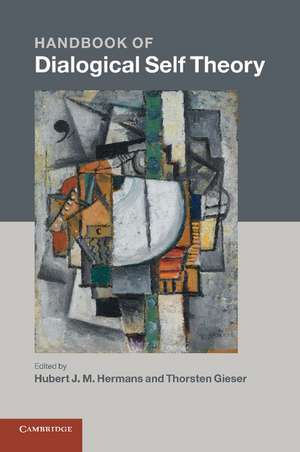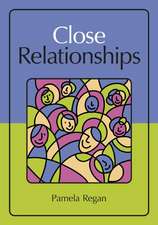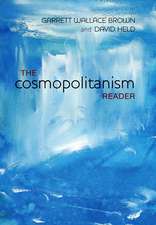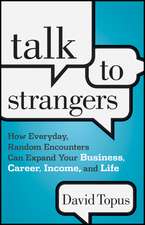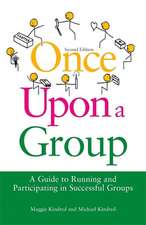Handbook of Dialogical Self Theory
Editat de Hubert J. M. Hermans, Thorsten Gieseren Limba Engleză Paperback – 22 ian 2014
Preț: 412.78 lei
Nou
Puncte Express: 619
Preț estimativ în valută:
78.98€ • 82.47$ • 65.37£
78.98€ • 82.47$ • 65.37£
Carte tipărită la comandă
Livrare economică 04-18 aprilie
Preluare comenzi: 021 569.72.76
Specificații
ISBN-13: 9781107681064
ISBN-10: 1107681065
Pagini: 518
Ilustrații: 17 b/w illus. 10 tables
Dimensiuni: 152 x 229 x 26 mm
Greutate: 0.69 kg
Editura: Cambridge University Press
Colecția Cambridge University Press
Locul publicării:New York, United States
ISBN-10: 1107681065
Pagini: 518
Ilustrații: 17 b/w illus. 10 tables
Dimensiuni: 152 x 229 x 26 mm
Greutate: 0.69 kg
Editura: Cambridge University Press
Colecția Cambridge University Press
Locul publicării:New York, United States
Cuprins
Introductory chapter: history, main tenets and core concepts of dialogical self theory Hubert J. M. Hermans and Thorsten Gieser; Part I. Theoretical Contributions: Introduction Hubert J. M. Hermans and Thorsten Gieser; 1. Positioning in the dialogical self: recent advances in theory construction Peter T. F. Raggatt; 2. Time and the dialogical self John Barresi; 3. Developmental origins of the dialogical self: early childhood years Marie-Cécile Bertau; 4. Self-making through synthesis: extending dialogical self theory Jaan Valsiner and Kenneth R. Cabell; 5. Multiculturalism, multiple identifications and the dialogical self: shifting paradigms of personhood in sociocultural anthropology Toon van Meijl; 6. Acculturation and the dialogical formation of immigrant identity: race and culture in diaspora spaces Sunil Bhatia; 7. Psychodrama: from dialogical self theory to a self in dialogical action Leni M. F. Verhofstadt-Denève; 8. Identity construction among transnational migrants: a dialogical analysis of the interplay between personal, social and societal levels Seth Surgan and Emily Abbey; 9. Negotiating with autonomy and relatedness: dialogical processes in everyday lives of Indians Nandita Chaudhary; 10. Dialogicality and the Internet Vincent W. Hevern; 11. Schizophrenia and alterations in first-person experience: advances offered from the vantage point of dialogical self theory Paul H. Lysaker and John T. Lysaker; 12. The dialogical self in the new South Africa Graham Lindegger and Charl Alberts; Part II. Methods for Studying the Dialogical Self: Introduction Hubert J. M. Hermans and Thorsten Gieser; 13. Dialogicality and personality traits Piotr K. Oleś and Małgorzata Puchalska-Wasyl; 14. Spatial organization of the dialogical self in creative writers Renata Żurawska-Żyła, Elżbieta Chmielnicka-Kuter and Piotr K. Oleś; 15. Cognitive architecture of the dialogical self: an experimental approach Katarzyna Stemplewska-Żakowicz, Bartosz Zalewski, Hubert Suszek and Dorota Kobylińska; 16. Voicing inner conflict: from a dialogical to a negotiational self Dina Nir; 17. Narrative processes of innovation and stability within the dialogical self Miguel M. Gonçalves and António P. Ribeiro; 18. Methodological approaches to studying the self in its social context Carol A. Jasper, Helen R. Moore, Lisa S. Whittaker and Alex Gillespie; Part III. Domains of Application: Introduction Hubert J. M. Hermans and Thorsten Gieser; 19. The use of I-positions in psychotherapy John Rowan; 20. Dialogically-oriented therapies and the role of poor metacognition in personality disorders Giancarlo Dimaggio; 21. Reconstructing the self in the wake of loss: a dialogical contribution Robert A. Neimeyer; 22. Creating dialogical space in psychotherapy: meaning-generating chronotope of ma Masayoshi Morioka; 23. Therapeutic applications of dialogues in dialogic action therapy David Y. F. Ho; 24. The depositioning of the I: emotional coaching in the context of transcendental awareness Agnieszka Hermans-Konopka; 25. The dialogical self and educational research: a fruitful relationship M. Beatrice Ligorio; 26. The self in career learning: an evolving dialogue Annemie Winters, Frans Meijers, Reinekke Lengelle and Herman Baert; 27. Navigating inconsistent consumption preferences at multiple levels of the dialogical self Shalini Bahl; Epilogue: a philosophical epilogue on the question of autonomy Shaun Gallagher.
Recenzii
'This is an incredibly engaging and comprehensive text that builds on the evolving dialogical self theory, applies the model to several fascinating and diverse global cases and still finds room to explain in thoughtful detail how to utilize these ideas in improving people's lives. What you have in the Handbook of Dialogical Self Theory is a comprehensive guide to the theoretical understanding, analysis, and practice of dialogical self theory with diverse case examples and multiple illustrations of its usefulness and practicality in a complex and changing world.' Jack S. Kahn, California School of Professional Psychology, Alliant International University
'This is a truly comprehensive examination of the multiple and diverse aspects of the emerging field of dialogical self studies. From a theoretical, methodological and practical vantage point an international group of scholars lays out the promises and possibilities of what will surely become an exciting field of inquiry as well as a foundation for new practices.' Henderikus J. Stam, University of Calgary
'The 'dialogical self' is among the most important and original new theories in the social sciences in the past 20 years. It is a theory for our times, addressing in complex and insightful ways the ways that globalization affects psychological functioning. In this book, the theory is presented lucidly and thoroughly, covering an impressive range not only in psychology but also sociology, economics, philosophy, and political studies. The book should be welcome in all those fields as a major contribution to the understanding of globalization.' Jeffrey Jensen Arnett, Clark University
'Longing for a 'big picture' look at dialogical self theory? Look no further! Besides providing detailed examinations of the theory itself, this handbook presents a plethora of ways to apply DST to research, psychotherapy, and education. DST scholars and practitioners will not be disappointed!' Jonathan D. Raskin, State University of New York
'Handbook of Dialogical Self Theory is a comprehensive consolidation of recent advances in the theory and practice of dialogical self theory (DST). The collection of 27 chapters provides a comprehensive explication of DST as a 'bridging theory' … the handbook provides an excellent resource upon which further innovative theoretical, research, and practical positions should be built. More important, readers who engage with the content will be changed by it: never again will you use phrases like 'sense of self' without feeling that someone, somewhere has something very different and important to say on the matter.' Gavin Sullivan, PsycCRITIQUES
'For those interested in DST, Hermans and Gieser's volume is a valuable and important contribution to the literature. And for those who are just curious and want to know more, they too will be rewarded. It is a rich, comprehensive compendium featuring many of the central players in the DST movement and it explores the idea of the dialogical self with a kind of earnestness and sense of purpose that many will find appealing.' Mark Freeman, Theory and Psychology
'The editors of this work are among the leading representatives of narrative psychology and creators of dialogical self theory (DST) … Of particular value is the fact that the authors represented are from Africa, India, Japan and China, in addition to traditional, Western centers of science … [This volume] merits use as an academic textbook on DST [and] … will interest 'humanists', including anthropologists, linguists, sociologists, psychologists, psychotherapists, psychiatrists, doctors and even business psychologists … Authors of individual chapters use a clear and lively style, so the concepts described will interest even those readers unfamiliar with the topic.' Mariusz Wołońciej, International Journal for Dialogical Science
'This is a truly comprehensive examination of the multiple and diverse aspects of the emerging field of dialogical self studies. From a theoretical, methodological and practical vantage point an international group of scholars lays out the promises and possibilities of what will surely become an exciting field of inquiry as well as a foundation for new practices.' Henderikus J. Stam, University of Calgary
'The 'dialogical self' is among the most important and original new theories in the social sciences in the past 20 years. It is a theory for our times, addressing in complex and insightful ways the ways that globalization affects psychological functioning. In this book, the theory is presented lucidly and thoroughly, covering an impressive range not only in psychology but also sociology, economics, philosophy, and political studies. The book should be welcome in all those fields as a major contribution to the understanding of globalization.' Jeffrey Jensen Arnett, Clark University
'Longing for a 'big picture' look at dialogical self theory? Look no further! Besides providing detailed examinations of the theory itself, this handbook presents a plethora of ways to apply DST to research, psychotherapy, and education. DST scholars and practitioners will not be disappointed!' Jonathan D. Raskin, State University of New York
'Handbook of Dialogical Self Theory is a comprehensive consolidation of recent advances in the theory and practice of dialogical self theory (DST). The collection of 27 chapters provides a comprehensive explication of DST as a 'bridging theory' … the handbook provides an excellent resource upon which further innovative theoretical, research, and practical positions should be built. More important, readers who engage with the content will be changed by it: never again will you use phrases like 'sense of self' without feeling that someone, somewhere has something very different and important to say on the matter.' Gavin Sullivan, PsycCRITIQUES
'For those interested in DST, Hermans and Gieser's volume is a valuable and important contribution to the literature. And for those who are just curious and want to know more, they too will be rewarded. It is a rich, comprehensive compendium featuring many of the central players in the DST movement and it explores the idea of the dialogical self with a kind of earnestness and sense of purpose that many will find appealing.' Mark Freeman, Theory and Psychology
'The editors of this work are among the leading representatives of narrative psychology and creators of dialogical self theory (DST) … Of particular value is the fact that the authors represented are from Africa, India, Japan and China, in addition to traditional, Western centers of science … [This volume] merits use as an academic textbook on DST [and] … will interest 'humanists', including anthropologists, linguists, sociologists, psychologists, psychotherapists, psychiatrists, doctors and even business psychologists … Authors of individual chapters use a clear and lively style, so the concepts described will interest even those readers unfamiliar with the topic.' Mariusz Wołońciej, International Journal for Dialogical Science
Descriere
This Handbook shows how dialogical self theory is useful for developing adaptive identities in a globalizing world.
